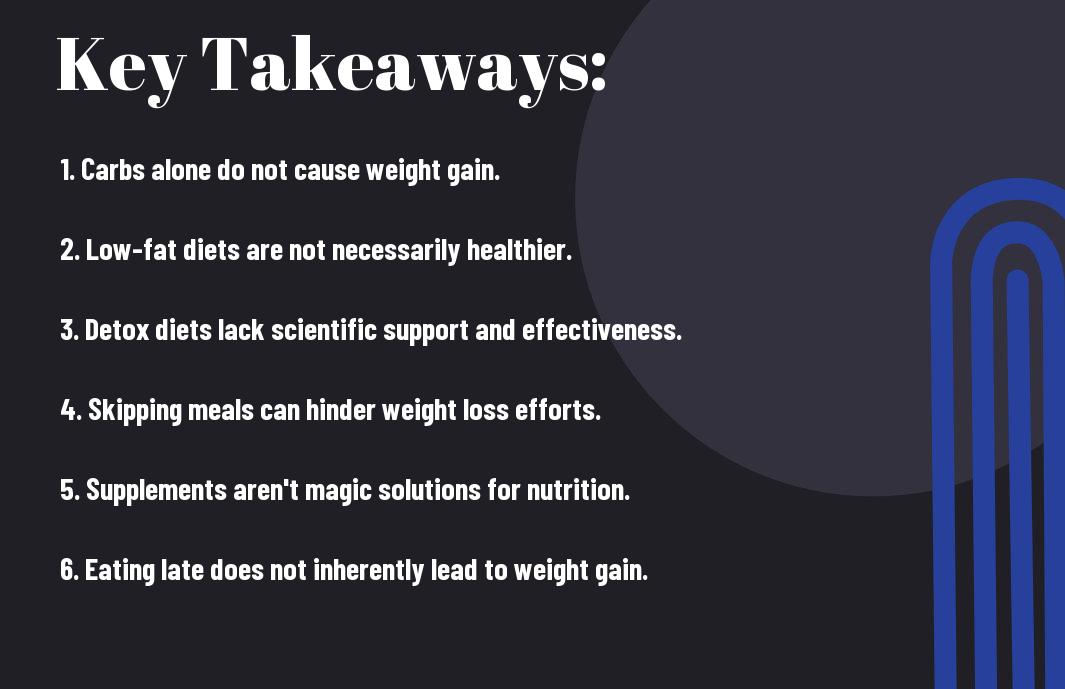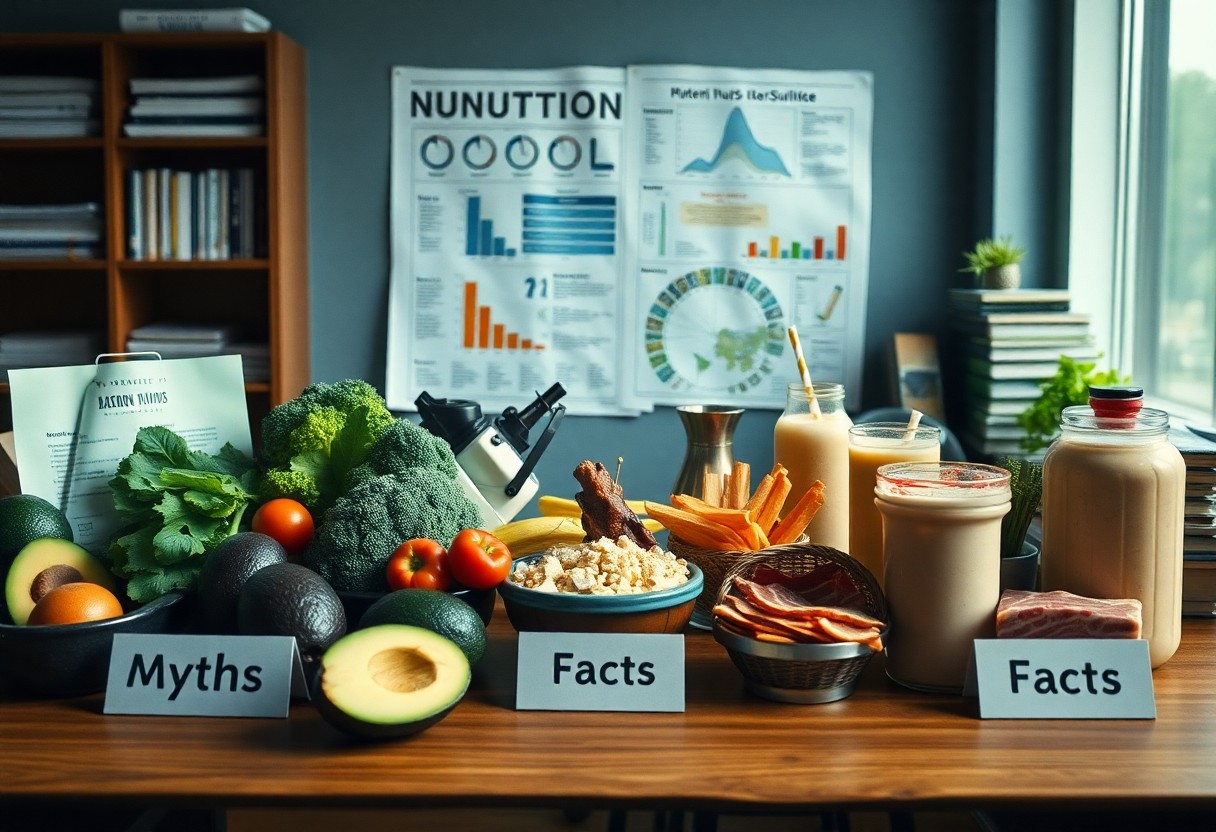With so much information circulating about diets, it can be challenging to distinguish between fact and fiction. You might have heard numerous claims about what works for weight loss, muscle gain, or overall health, but not all of these popular notions hold up under scientific scrutiny. In this post, you will explore well-known diet myths and uncover what research actually indicates, helping you make informed decisions about your health and nutrition.

Key Takeaways:
- Low-Carb Diets are not universally effective; individual metabolism plays a significant role in weight loss outcomes.
- Detox Diets have no scientific basis; the body naturally detoxifies itself through organs like the liver and kidneys.
- Skipping Meals can lead to increased hunger and overeating later; it’s better to maintain regular meal times.
- Fad Diets often lead to short-term weight loss but can be unsustainable and may harm health in the long run.
- Fat-Free Foods are not necessarily healthier; they can be high in sugars or artificial ingredients to compensate for flavor.
- Eating Late at Night does not inherently cause weight gain; overall calorie intake is what matters most.
- Supplements cannot replace a balanced diet; whole foods provide the best nutrients for health and wellness.
Common Diet Myths
While navigating the complex world of diet and nutrition, you may encounter several commonly held beliefs that suggest what you should or shouldn’t consume. Understanding these myths is imperative to making informed decisions about your health. Busting these misconceptions can empower you to adopt a balanced approach to eating that aligns with scientific evidence and supports your personal wellness goals.
Myth: Carbs Are the Enemy
Above all, you might have heard that carbohydrates are detrimental to your health, leading to weight gain and other issues. However, various studies indicate that not all carbs are created equal. Whole grains, fruits, and vegetables provide imperative nutrients, fiber, and energy, playing a vital role in a balanced diet.
Myth: Fad Diets Are Sustainable
Behind the allure of quick weight loss, you may find that fad diets often promise more than they can deliver. These restrictive eating patterns may not be designed for long-term sustainability and can lead to unhealthy habits, nutritional deficiencies, and eventual weight regain.
It is imperative to recognize that while fad diets might provide immediate results, they rarely foster lasting change. Most people find it challenging to maintain such restrictive eating patterns, leading to a cycle of yo-yo dieting. Instead of focusing on these extreme measures, you should prioritize a balanced, diverse diet that you can enjoy and sustain over time, ensuring that you not only achieve your weight goals but also nurture your overall health and well-being.

The Science Behind Weight Loss
One of the core principles of weight loss is that it fundamentally hinges on the balance between the calories you consume and the calories you expend. When you create a caloric deficit, whereby you burn more calories than you take in, your body begins to utilize stored fat for energy, resulting in weight loss. Understanding this principle can empower you to make informed decisions regarding your diet and lifestyle, ultimately helping you achieve your weight loss goals.
Caloric Deficit Explained
Behind weight loss is the concept of caloric deficit, which occurs when you consume fewer calories than your body requires for energy. Your body compensates for this deficit by tapping into stored energy, primarily fat, leading to a decrease in overall body weight. To achieve sustainable weight loss, you can either reduce your caloric intake, increase your physical activity, or implement a combination of both strategies.
The Role of Macronutrients
By understanding macronutrients—carbohydrates, proteins, and fats—you can better manage your diet to support weight loss. Each macronutrient plays a unique role in your body’s function, such as providing energy, supporting muscle growth, and aiding in hormone production. Balancing these macronutrients can enhance your weight loss efforts and promote overall health.
In addition to just counting calories, focusing on the types of macronutrients you consume can significantly impact your weight loss journey. For example, protein can help you feel full longer and preserve muscle mass during weight loss, while healthy fats are crucial for hormone regulation. Carbohydrates provide quick energy and can fuel your workouts effectively. Finding the right balance of these macronutrients for your specific needs will enable you to create a diet plan that supports sustainable weight management.
The Impact of Metabolism
Now that you’re exploring popular diet myths, it’s vital to understand the impact of metabolism on your body and weight management. Many believe that a slower metabolism means weight gain, while a faster one guarantees weight loss. However, the truth is more nuanced. For insights, check out Eight Healthy Eating Myths Debunked | Blog.
Understanding Basal Metabolic Rate
Along with metabolism, your Basal Metabolic Rate (BMR) plays a significant role in how many calories you burn at rest. Your BMR affects how efficiently your body utilizes energy, and it can be influenced by factors such as age, sex, and body composition.
Factors Affecting Metabolism
The rate of your metabolism is impacted by several factors, which include:
- Genetics
- Muscle mass
- Age
- Physical activity
Thou must consider these elements when assessing how metabolism influences your weight management strategy.
Understanding the factors affecting metabolism can help you tailor your dietary choices and exercise routines. These aspects can synergistically affect how your body processes food:
- Hormonal balance
- Thermic effect of food
- Environmental temperature
- Stress levels
To optimize your metabolism, thou may need to focus on maintaining a healthy lifestyle encompassing balanced nutrition and regular physical activity.

Misconceptions About Meal Timing
Not all diet myths hold true, especially when it comes to meal timing. Many believe that when you eat profoundly impacts weight loss, but science shows that total caloric intake and the quality of your food matter more. For more insights on these myths, check out this article on the 7 Biggest Diet Myths.
Breakfast as the Most Important Meal
The idea that breakfast is the most important meal of the day has been widely circulated, yet scientific studies reveal mixed results. Some suggest that skipping breakfast does not lead to weight gain and that your overall calorie consumption throughout the day is what truly matters.
Snacking and Weight Gain
On the topic of snacking, many people fear that it leads to weight gain. However, snacking can actually be a healthy part of your diet when done mindfully and with nutritious options.
Another key point is that not all snacks are created equal. Healthy snacks can curb hunger between meals, preventing overindulgence later on. If you choose wholesome and low-calorie snacks, you can maintain your energy levels without negatively impacting your weight. Monitoring portion sizes and avoiding processed options can help you snack wisely, allowing you to enjoy food without guilt.

The Truth About Supplements
For many people, supplements seem like a quick fix for nutrition gaps, but the reality is more complex. While they can serve a purpose, their efficacy isn’t a substitute for a balanced diet. You might find it enlightening to explore the 10 common nutrition myths debunked, which sheds light on misconceptions surrounding supplements.
Effectiveness of Popular Supplements
Supplements may promise various benefits, but their overall effectiveness can be variable. While some vitamins and minerals can support your health, others may not provide the outcomes you expect. It’s important to evaluate your needs and consult with a healthcare professional before relying on specific supplements.
Safety and Regulation Issues
After considering their effectiveness, you should also be aware that supplements are not always rigorously tested for safety before coming to market. The lack of stringent regulations means some products may contain questionable ingredients or dosages. Therefore, it’s crucial to do your research and choose supplements wisely.
About 80% of the supplements on the market haven’t undergone the same rigorous testing as prescription medications. This means that you may be putting yourself at risk with unverified health claims or potentially harmful additives. It’s advisable to purchase from reputable brands that follow good manufacturing practices and to engage with a healthcare provider when considering new supplements for your wellness regimen.
Psychological Aspects of Dieting
To achieve lasting success in your dieting journey, it’s important to understand the psychological aspects that can significantly impact your relationship with food. Your mindset plays a pivotal role in how you approach weight loss, making it vital to address emotional triggers, cravings, and the influence of societal pressures on your eating habits. By recognizing these factors, you can create a more effective and sustainable diet plan tailored to your needs.
Emotional Eating
Among the key challenges you may face while dieting is emotional eating, which often occurs as a response to stress, boredom, or sadness rather than true hunger. This behavior can sabotage your efforts and lead to unhealthy food choices, further complicating your journey. By being aware of your emotional triggers, you can better manage your responses and develop a healthier relationship with food.
The Role of Mindfulness in Eating
Dieting can be greatly enhanced by incorporating mindfulness into your eating habits. This approach encourages you to be present during meals, allowing you to fully appreciate flavors and textures, and better listen to your body’s hunger and satiety cues.
Even small shifts in your eating practices can lead to significant improvements. By fostering mindfulness, you can cultivate awareness of your cravings and emotional responses to food, which allows for more conscious choices. This not only helps in managing portions but also enhances the overall satisfaction from your meals, ultimately supporting you in achieving your dietary goals. Engaging in mindfulness techniques like slow eating can transform your experience, making it more enjoyable and effective in the long run.
Final Words
The exploration of popular diet myths reveals a landscape filled with misinformation that can hinder your progress toward a healthier lifestyle. By grounding your dietary choices in scientific evidence, you empower yourself to make informed decisions that align with your personal health goals. It’s important to critically evaluate the claims you encounter, focusing on research-backed information that advocates for balance and moderation. Your journey to better health is not just about following trends, but understanding what truly supports your well-being.
FAQ
Q: Is eating fat bad for you?
A: Many people believe that consuming dietary fat leads to weight gain and poor health. However, science has shown that healthy fats, such as those found in avocados, nuts, and olive oil, can be beneficial for heart health and can help in maintaining a balanced diet. The key is to focus on the type of fats consumed rather than eliminating them completely.
Q: Do carbohydrates make you gain weight?
A: Carbohydrates have often been demonized as a source of weight gain. However, not all carbs are created equal. Whole grains, fruits, and vegetables are important for a balanced diet and provide important nutrients and fiber. Weight gain occurs when there is an excess of calories consumed, not just from carbs alone.
Q: Can you lose weight by skipping meals?
A: Skipping meals may seem like an effective way to reduce calorie intake, but it can lead to increased hunger later and potential overeating. It might also slow down metabolism. Eating regular, balanced meals is generally a more effective strategy for weight management.
Q: Is a detox diet necessary for cleansing the body?
A: Many detox diets claim to flush toxins from the body, but scientific evidence does not support their effectiveness. The body has its own mechanisms for detoxification through the liver and kidneys. A balanced diet rich in whole foods, hydration, and regular exercise is typically sufficient for maintaining good health.
Q: Does eating late at night cause weight gain?
A: The idea that eating late at night leads to weight gain is a common myth. Weight gain is related to the total number of calories consumed versus calories burned, regardless of when meals are eaten. That said, late-night eating can sometimes lead to unhealthy food choices or overeating, so mindfulness is key.
Q: Are all calories equal in terms of weight management?
A: While a calorie is a unit of energy, not all calories have the same nutritional value or effects on the body. For instance, 100 calories from candy do not provide the same satiety, nutrients, or health benefits as 100 calories from vegetables. Focusing on the quality of calories is important for overall health and weight management.
Q: Do diet foods help with weight loss?
A: Many diet or low-calorie foods can be misleading. While they may seem like a healthier option, they can often contain artificial ingredients or added sugars that may not contribute positively to health. Whole foods that are naturally low in calories, such as fruits and vegetables, are generally better choices for weight management.




